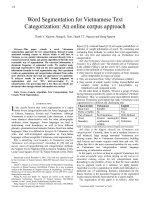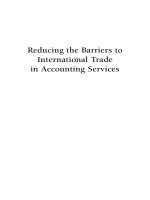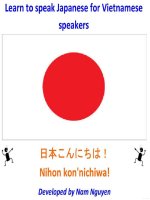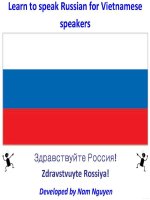Barriers to obtain Visa for Vietnamese passports
Bạn đang xem bản rút gọn của tài liệu. Xem và tải ngay bản đầy đủ của tài liệu tại đây (69.33 KB, 3 trang )
<span class='text_page_counter'>(1)</span>Is it difficult or easy for Vietnamese passport to obtain foreign visa?. It is very common that more people, nowadays, tend to travel around the world thank to the rapid improvement of the standard of living in our modern society. In fact, although the right to free movement is enshrined in the Universal Declaration of Human Rights, officially recorded in over 80 national constitutions and international agreements (O’Byrne, 2001, quoted in Schofield), there are a broad range of barriers preventing us from travelling abroad. This is especially true in the developing and poor countries, and Vietnam is a perfect example of it. In some positive views, we cannot deny the fact that there are many more Vietnamese citizens going on foreign tours than ever before. However, they have obviously just visited a number of popular destinations such as some European countries or ASEAN countries, which are only a part of the whole world. It is certainly true that tourists holding Vietnamese passports have been experiencing a variety of difficulties in progress of getting a visa. In this essay, I would like to mention about three aspects of the issue: the number of countries whether Vietnamese people can enter without visa with the period taken Vietnamese to obtain a visa and the solutions to the problem visa. The ease of accessing abroad of Vietnamese passport is often considered based on the number of countries Vietnamese citizen can come in without visa. According to the Henley Visa Restrictions Index - Global Ranking 2012, it is easy for us to see that Vietnam rank at the 89th position scoring 44, which is nearly a quarter of the Denmark's score, 169 at the first rank. To be honest, in spite of being a developing country, the Vietnamese government is trying to gain international prestige which aims to persuade other countries' embassies to simplify visa requirements and even visa exemptions for Vietnamese citizens. Surprisingly, 69 bilateral visa exemption agreements have been signed between Vietnam and other countries: including Brazil, India, Banladesh, China and so on (the website of the Ministry of Foreign Affairs, 2012). In contrast, many Vietnamese young people find it very challenging to obtain a visa before going abroad. For instance, Huyen, a young girl known-well as the first Vietnamese person crossing 25 countries with 700 USD, stated that: "I have had to cry so many times as I was denied visas to countries that I really wanted to visit, even after I had tried for months while my friends from other countries simply just walk in those countries when they want to… May I suggest that visa barrier is just a new form of racism, or “countrism”, as the only thing that makes you disqualified from something that other people are is just the country tag on your passport. It’s like we are being punished for being born in the wrong country, for being born to parents with the wrong citizenship…. Are you saying that people from poor countries are more likely to stay back and take illegal jobs? It’s the same as a rich friend only allows his rich friends to come in because he’s afraid his poor friends will steal from his.
<span class='text_page_counter'>(2)</span> house…Is it 100%? Of course NOT. In fact, those people are just minority… You can’t look at a minority of our population and punish the majority of us. ". This leads to the question: How effectively are visa exemption agreements implemented in real life? Sadly, the exact answer has not been given yet. On the other hand, fortunately, it is still very convenient for Vietnamese people to enter several countries in ASEAN without visa due to the ASEAN Framework Agreement on Visa Exemption in 2006. In general, not only Vietnam but other countries also endure these biases; restrictions and barriers however have been placed on a person’s right to travel throughout the world with justifications that include security threats, migration controls and government regulations (Hosein, 2005, quoted in Schofield) and they are, however, publicly accepted in the UK breach several international treaties (Hayter, 2000, quoted in Schofield). To overcome the above stated difficulties, there are necessarily a lot of supports from various governments and human rights organizations in a long term. First and foremost, undoubtedly, it is suggested that Vietnamese government as well as the Ministry of Foreign Affairs should be encouraged to have practical policies or new agreements with other countries to enable the Vietnamese citizen to pass the visa progress as soon as possible. In addition, annual surveys about effectiveness of the agreements should also be applied widely to find specific delays and therefore, the feedbacks will bring essential and positive changes in the responsible authorities. Besides, it might be possible for someone to get the second visa as can be seen in other countries. Fadi Mehio, for example, a "businessman is in the process of getting his Bulgarian citizenship through a unique Immigrant Investment Program that enables investors to get residency and eventually citizenship to the Eastern European country." Owing to this, he can get many benefits: such as "ease of travel" and "assets are protected" with justified that "I’m not trying to change my identity. Just extend my reach"(Global Citizen, 2012). Last but not least, Huyen is running her great idea and admittedly that "I propose the establishment of a foundation, called Traveling is an Equal Opportunity Foundation (TEOF) to help people to achieve their dreams". Thus, she has spreads her plan via the Internet and even her speech at TEDx meeting. Overall, combat against restrictions in obtaining visa is extremely hard and therefore, it will definitely need to be supported consistently by every part of society in the future. In conclusion, even though there have not been many arguments about whether obtaining a visa for Vietnamese passport is difficult or easy, this issue should be discussed more seriously and popularly. We cannot just ignore this because of disadvantage influences foreseen afterwards in both culture and economy: such as hurting national self esteem in the young generations or preventing the growth of tourism and trading across nations. What is more, this fight not only prove that it is never right to look at the whole complicated thing based on some minority aspects and I personally agree with saint Augustine that "The world is a book, and those who do not travel read only one page".(quoted in Huyen, 2012). References:.
<span class='text_page_counter'>(3)</span> List=dc7c7d75-6a32-4215-afeb-47d4bee70eee&ID=64
<span class='text_page_counter'>(4)</span>









